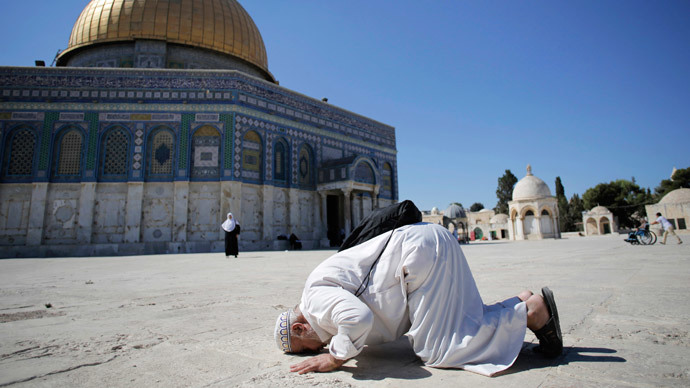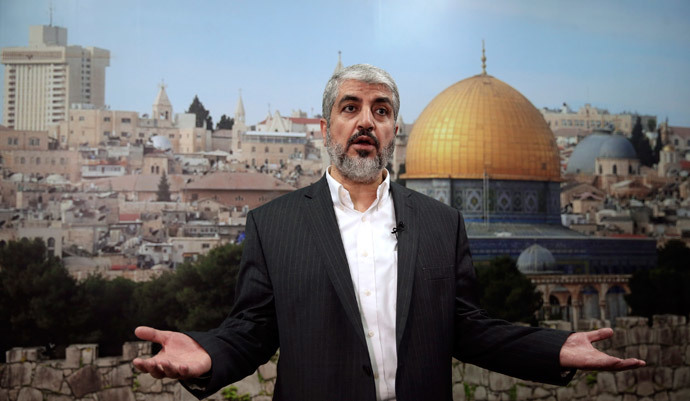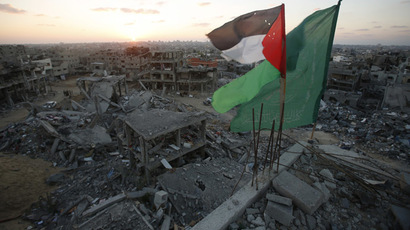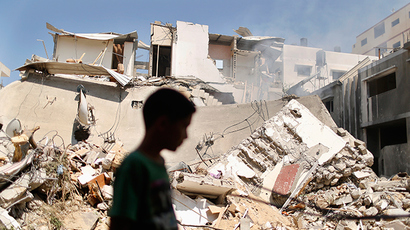Hamas leader calls on Muslims to ‘defend’ Jerusalem’s Al-Aqsa mosque

Hamas chief Khaled Meshaal has urged Muslims to “defend” the Al-Aqsa mosque in Jerusalem after Israeli forces restricted the entrance for Palestinians. He accused Israel of trying to seize the site, which is considered holy for both Muslims and Jews.
READ MORE: Clashes erupt in Jerusalem as Palestinians ‘denied’ access to holy mosque
“We call on all our people inside the country to hurry up to
al-Aqsa to defend it,” Meshaal said in a statement from
Doha, Qatar.
“We call on the nation to be angry and to send a message of
painful anger to the world that the Palestinian people, the Arab
and Muslim nation, will not be silent at the Israeli crime,”
Meshaal added.
When asked if such a call might trigger another conflict soon
after the deadly 2014 Gaza war, the Hamas leader said:
“Nobody wants a war, but it’s our right to resist and
preserve our rights. We are under occupation...We have been
resisting for one hundred years and will continue.”
“Al-Aqsa is worth us becoming martyrs for, and anyone who can
carry a weapon in the region should go and defend it, as this is
the true meaning of jihad,” Meshaal added, prompting alarm
from both media and the region’s politicians.

Earlier, Israeli forces decided to only allow Palestinians over the age of 50 to enter the site, which is considered the third holiest shrine in Islam. The Palestinian population feared Israel was going to restrict access to the mosque for all Muslims. That caused the latest in a series of clashes with Israeli police at the site.
Israeli Prime Minister Benjamin Netanyahu has denied all the
assumptions, saying the extremists are to blame for the violence.
“I am committed and Israel is committed to maintaining the
status quo exactly as it has been for many decades,” he said
on Monday. “What we’re seeing are Palestinian extremists who
are instigating violence through incitement. The incitement is
spread by false and baseless rumors that we are threatening the
Muslim holy places. Nothing could be further from the
truth.”
Netanyahu said Israel would continue to scrupulously maintain the
protection of holy sites and the right of all religions to
worship in their holy places.
According to Meshaal, however, Israel is trying to use the
regional turmoil to take over the mosque.

The former site of a Biblical temple, Al-Aqsa is considered a
holy site for Jews. After the 1967 Six-Day War, the complex was
immediately handed over to Muslim authorities. Non-Muslim visits
to the Al-Aqsa complex are allowed and regulated by Israeli
police, but Jews are not allowed to pray at the site for fear it
could cause disturbances and protests from Muslims. Jews have to
come as tourists and pray at the Western Wall. During the Jewish
holiday of Sukkot, celebrated over October 8-15 this year, Jews
historically make pilgrimages to the compound, which they call
Temple Mount.
Jerusalem’s Grand Mufti Muhammad Hussein has insisted that the
compound is “a holy site for Muslims only.”
Israeli Public Security Minister Yitzhak Aharonovitch threatened
Tuesday to close the compound entirely if members of the two
faiths could not pray there peacefully.
“We want [the compound] to stay open for Muslims and Jews,
but if Jews can’t go there, neither can Muslims,” the
minister was quoted as saying by military radio.
The latest outbreak of tensions over the holy site started in
2000, after Israeli politician Ariel Sharon’s visit to Al-Aqsa
triggered a Palestinian uprising that lasted five years – the
so-called Second Intifada.














